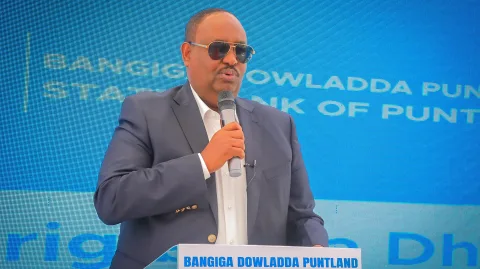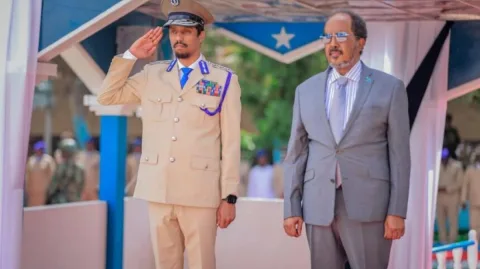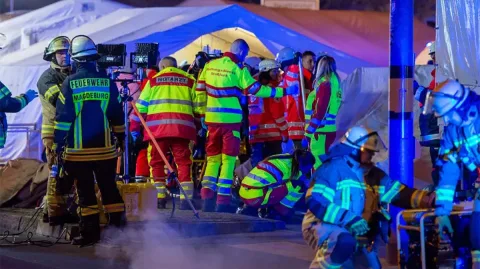It has been already three years since the current president of Somalia was elected for the…
It has been already three years since the current president of Somalia was elected for the top seat, an election that created positive atmosphere among the Somali people who were eager for the change, considering the corrupt government, Mr. Hassan was leading at the time. Mr. Mohamed Abdullahi Farmajo, the elected president was a president the people knew for his integrity and patriotism for his country during his tenure as the Prime Minister. As a person, he is known to be descent, respectful and hardworking. He doesn’t talk much to the press nor does he show off his achievements.

Mr. Farmajo didn’t waste time in appointing a Prime Minister, and allotted Mr. Ali Kheyre as his Prime Minister to form a cabinet of ministers from elite and experienced, which he indeed did a month later. Mr. Farmajo, building on the successes achieved by his predecessors, continued to strengthen and promote good governance, fight corruption and seek wider international recognition. He has closely worked and cooperated with the international community, and strengthened relationship with the neighboring countries as well as with the Arab world. His government achieved quick results in all fronts, including, but not limited to, the development of sound financial management that resulted to a plausible debt relief, building strong army, and sending thousands of others for military training to join the current army, paving the way for the take over from AMISOM forces, minimizing the threat of anti-government elements, and supporting the federal states.
However, Farmajo had to deal with hard-hitting tests during his presidency, particularly with the foreign state interests. United Arab Emirates, that was in favor of Hassan Sheikh during the elections, and Hassan Sheikh referred to them as a “permanent strategic ally”, hoped the relationship between the two countries would prosper to the maximum if Hassan is re-elected. Instead, Farmajo had come to power, and soon, UAE’s hopes of taking over the major sea ports in Somalia through DP world had been dashed. Political analysts say the biggest challenge Farmajo is currently facing comes from UAE. This has also coincided with the Gulf diplomatic crisis with Qatar as Somalia soon appeared to be the battle field for the Gulf countries. Somalia took a neutral stance in the Gulf crisis.
It is worth mentioning that UAE took over the ports in Bossaso and Hargeisa, Puntland and Somaliland respectively, without the consent of the Federal Government that considered this as an intervention of Somali’s sovereignty and affairs. With the week government Farmajo had taken over from Hassan Sheikh, that controlled limited territories and the dependency of AMISOM troops as the only forces to fortify the security in the South and the capital city of Mogadishu, the president struggled in achieving more results in the security front pertaining to reasons beyond the control of the government.
Likewise, the foreign states had great influences in the politics of Somalia prior to the elections, but that was soon shattered by Mr. Farmajo, who called for cooperation, but not dictation. Governments like Ethiopia and Kenya had never taken their hands off Somali’s politics since the collapse of the central government in 1991 to preserve their interests under the cover of fighting terrorism and helping Somalia realize an adequate level of security. Donors and the UN had also their own influences, having not seen a caliber of politicians that can well handle the disintegrated country and take Somalia out of the political quagmire. Overcoming tough tests placed by the UN and the foreign states, Mr. Farmajo proved to be the chosen one and is believed to have the caliber; the international community is looking for. He is compared to that of Paul Kagame of Rwanda, but with a state, whose people and politicians have conflicting interests.
Mr. Farmajo’s administration couldn’t tolerate the apparent meddling of the UN special envoy in the politics of Somalia, who has committed several unforgivable mistakes of turning the head of regional states against the government, acting like the ruler of Somalia and working towards the breaking up the federalism. Despite the high level of diplomacy Farmajo’s administration has demonstrated over the period of its existence, the UN Envoy, Mr. Nicholas Haysom was eventually expelled from Somalia in January 2019, and was replaced by the current envoy, Mr. James Swan. This has sent strong signal to other states that Somalia is no longer the diplomatically weak government it used to be, and that even though Somalia depends on the international aid, but wouldn’t accept to give away its integrity and honor. A much known IGAD representative had also been chased from Somalia, known as Gebre, an Ethiopian diplomat who was believed to have meddled in to the politics of Somalia to the extent that he acted as the de facto boss of the top leaders during Hassan Sheikh’s administration. In fact, during the three years, Farmajo’s administration had gained a prestige of the government that stands alone, operates independently but cooperates diplomatically with all actors including donors and foreign states.
Farmajo’s administration is at times, accused of being dictatorship, but I am supportive to this and don’t hesitate to call it the necessary dictatorship. Puntland threatens to separate if it is not favored with privileges and special treats while Jubaland’s leader, Mr Ahmed Madoobe, doesn’t consider himself as reporting to the federal government. He has mentioned in several occasions that he came to power using force and carrying deaths, and he can only give up the power through the same force, a stance that didn’t give window for negotiations. Like Puntland, Jubaland also demanded privileges and threatened not to cooperate with the Federal Government. The only solution the federal government could see was to see off the presidents of these regional states to finish their period of presidency, and lobby for a change, leaders who could cooperate with the Federal Government in achieving the objective of stabilizing the country.
Farmajo had participated in the inauguration ceremony of the newly elected president of regional state of Punltand, Mr. Deni, hoping to establish healthy relationship with him, and through him, also attain the cooperation of the other regional presidents, but Mr. Deni was not up to the expectation and proved to be prioritizing his own interests above the national interests of Somalia. Mr. Deni, is strong ally with UAE, and is busy day and night weakening the federal government of Somalia in order to get away with his uncovered deals. Ahmed Madobe, Jubaland tyrant, on the other hand, is closely cooperating with UAE and Kenya, the latter being a part of the maritime border dispute with Somalia, a case that is being handled by the ICJ. What options are open for Farmajo, except for exercising some degree of dictatorship to manage politicians that are susceptible to foreign baits and have the propensity to betraying their country to reach their personal interests?
In conclusion, Farmajo’s three years of presidency was a success. His top priority is building an army that can secure the country and prepare the country for after-AMISOM era. In my opinion, Farmajo’s presidency should be extended for additional period of at least three years to achieve more results since we cannot see any other politician, with the quality required, who can currently take over from Farmajo. Until then, he will for sure, prepare the country of one man one vote elections and finalize the current draft constitution. Federal states will also enjoy relative development and prosperity. He is the president of the people, and is considered to be the least corrupt leader that Somalia ever had in history. I believe that, with elections of one man one vote, Mr. Farmajo will be re-elected and can take Somalia to different level much like Rwanda.





